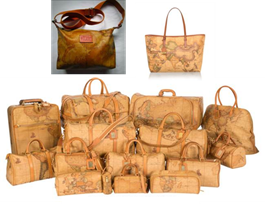Kim & Chang successfully represented an Italian company in a challenging legal dispute against a Korean business that was imitating its trademarks and overall business concept.
The Italian fashion brand, Alviero Martini, is well-known for its original products bearing a distinctive and highly recognizable map logo sold under the “1A CLASSE” mark. Alviero Martini noticed that a Korean business was not only selling lookalikes of its products, but had also filed various trademark applications for imitations of Alviero Martini’s marks. The registrations illegally obtained by the Korean business included imitations of the map logo mark and the word mark PRIMA CLASSE, which is a phonetic imitation of the Italian pronunciation of the Italian company’s 1A CLASSE mark (i.e., “1A” is pronounced “prima” in Italian, thus the mark literally means “first class”).
| Alviero Martini’s Products | Korean Business Imitations |
 |
 |
In order to regain rights to its intellectual property, Alviero Martini retained Kim & Chang to file invalidation actions against the imitations of its map logo marks and word marks, and a parallel preliminary injunction action against the sales of the imitation products.
The invalidation actions, based on similarity to Alviero Martini’s prior registered marks and the fame of these marks at the time the imitation marks were filed, were initially rejected by the Intellectual Property Trial and Appeal Board, but Kim & Chang was able to reverse the decision at the Patent Court and convince the Supreme Court of Korea to reject the appeals from the imitators. The preliminary injunction action was partly granted by the District Court as to the sale of imitations bearing an imitation map logo, and the High Court subsequently granted preliminary injunctive relief as to the sale of goods bearing the imitation PRIMA CLASSE mark.
This matter was challenging because map devices have generally not been recognized as sufficiently distinctive to function as source identifiers under Korean practice, and the word mark could have been considered descriptive given its meaning. Another difficulty was convincing the courts that Korean consumers would be able to recognize that 1A CLASSE corresponded to the Italian expression “prima classe,” given that Korean consumers are likely not very familiar with the Italian language, and in view of existing precedents that suggested it was more likely that the courts would believe that Korean consumers would read the Italian company’s mark as “one A classe” or “first class.”
Despite these hurdles, Kim & Chang ultimately was able to prevail by demonstrating that the Italian company’s map logo could and did function as a source identifier for the goods to Korean consumers, and thus was not merely a decoration and would have been recognized as “prima classe” by Korean consumers.
These decisions were critical to Alviero Martini’s fight to regain the rights to its brands and to clear the market of the Korean business’ infringing goods. These decisions will also make it easier to protect foreign language trademarks due to its ruling that actual market conditions should be taken into consideration when reviewing the pronunciation of marks in foreign languages. It is also expected that courts will be more flexible moving forward in reviewing the distinctiveness of map logo marks.
Related Topics
#Invalidation Action #Imitation #Foreign Language Trademark #IP #IP Litigation




